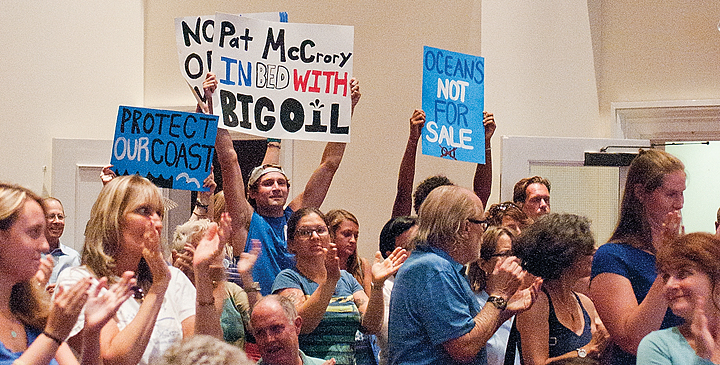
The Wilmington City Council unanimously passed a resolution opposing offshore drilling and seismic testing off the North Carolina coast during its Tuesday, July 21 meeting.
“Why add to seismic activity when we already don’t know 30 years from now what impact it may have in order to find something we oppose getting to once they find it?” said council member Laura Padgett. “I have seen oil on the southern coast of California that came from a spill almost 50 years ago. It does not go away.”
Council member Charlie Rivenbark said he’d rather have a clean, healthy coastal environment than receive revenue from oil drilling.
“I bet there are a lot of people on the Gulf Coast that would give that money back. It’s nice to know that there hasn’t been an oil spill on the Atlantic seaboard,” he said.
Lindsey Deignan, vice president of the Cape Fear chapter of the Surfrider Foundation, emphasized the ecological damage that would occur to North Carolina if an oil rig were to leak.
“The most important thing is the potential degradation of ecosystem services. Some of the most obvious ones are fisheries, clean water, processing of nutrients and waste, the hurricane protection our well-kept wetlands provide for us,” she said.
North Carolina’s fishing, tourism and recreation industries are dependent on healthy coastal ecosystems, Deignan said.
“Those three industries support roughly 51,000 jobs and generate about $2.2 billion in GDP,” she said. “If we look at this graph the North Carolina Commerce Department put out for 2013 data, is shows that visitor spending to New Hanover County alone was almost $480 million. This translates to high state and local tax revenue.”
Douglas Nowacek, a professor at Duke University’s marine lab who is a specialist in marine mammal bioacoustics and seismic surveys, also urged the council to support the resolution.
“Noise that is out of the ordinary, that is anything that is louder than ambient levels, can disrupt the behavior of these animals,” he said.
Nowacek described the intensity of the air guns used for seismic testing.
“The air guns used generate the most intense sound put in the ocean other than explosives. A standard air gun array put behind a vessel generates 250-260 decibels of sound. To put that in context, due to the efficiency with which sound travels underwater, under certain propagation conditions, those sounds can and have been heard 2,500 miles away from the source.”
Robert Gisiner, director of marine environment at the International Association of Geophysical Contractors, urged the council to oppose the resolution. Gisiner said drilling for oil will help meet the energy demands of the Wilmington metropolitan area. He also added that seismic testing will aid the drilling process.
“When we redid surveys with modern technology in the Gulf of Mexico, there was five times as much oil and gas there as we thought there was in ’83. There’s a very good chance the same thing is going to happen here,” Gisiner said.
email [email protected]




